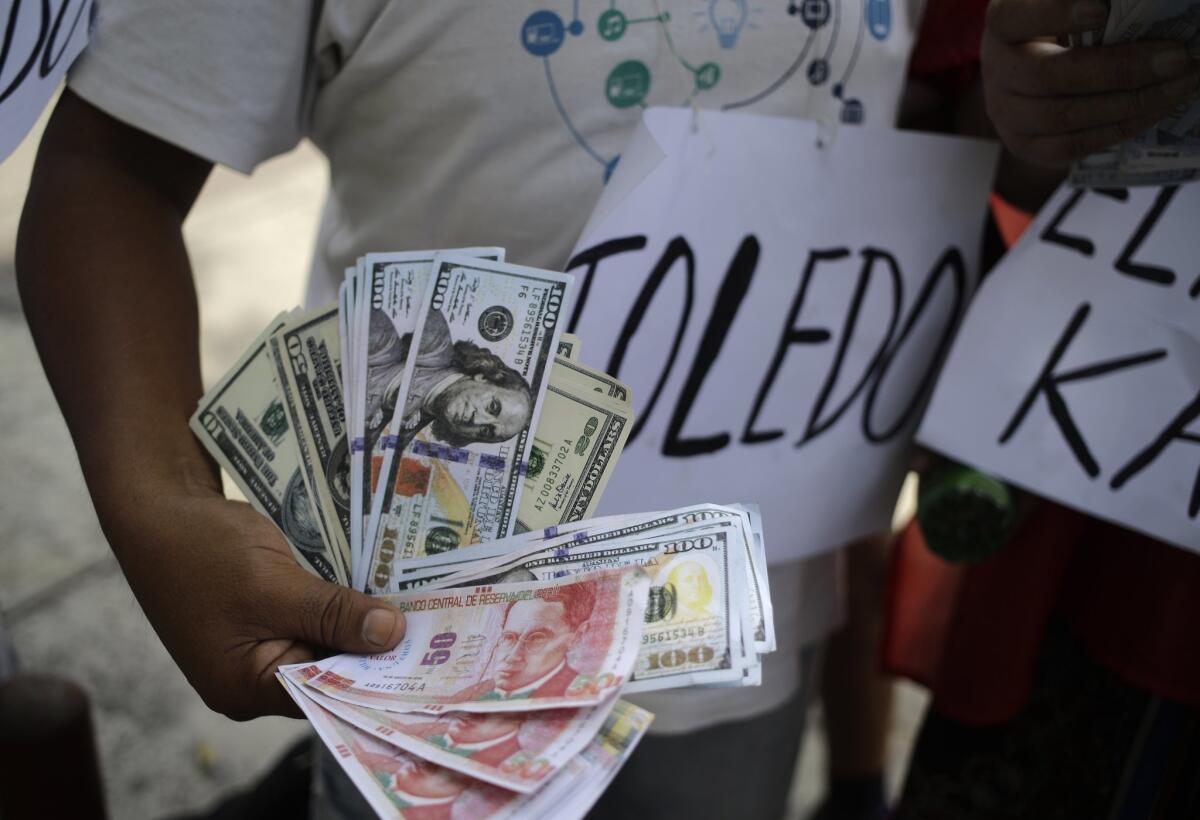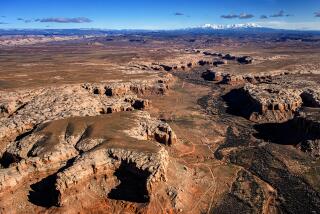Latin America bribery scandal widens to engulf two of the continent’s highest profile figures

- Share via
Reporting from LIMA, Peru — In late December, Brazil’s largest construction company pleaded guilty in U.S. federal court to having paid $788 million in bribes to government officials throughout Latin America to secure public works contracts.
Less than two months later, the scandal has spurred investigations in Colombia, Mexico, Peru, Panama, the Dominican Republic, Venezuela, Chile, Argentina, Guatemala and Ecuador. It has also spread to Africa, with corruption cases opened in Angola.
This week brought new accusations that two of the continent’s highest-profile figures benefited from bribes paid by the firm, Odebrecht, which specializes in massive public works and energy projects.
In Peru, a prosecutor issued an arrest order for former President Alejandro Toledo, who stands accused of accepting a $20-million bribe. In Colombia, a witness told prosecutors that President Juan Manuel Santos’ 2014 campaign received a nearly $1 million contribution.
The Odebrecht scandal started in 2014 as a money laundering investigation in Brazil and became known as the “Car Wash” because bribes were being funneled through a gas station. Brazilian politicians have been charged with taking bribes to help the company secure contracts with the state oil company Petrobras.
The U.S. Department of Justice — which became involved because Odebrecht entities used the U.S. banking system and have shares and debt traded on U.S. securities exchanges — turned up evidence of a department in the company specifically dedicated to paying bribes, often using shell corporations and tax havens such as Andorra and the Cayman Islands to avoid detection.
U.S. prosecutors charged Odebrecht under the Foreign Corrupt Practices Act.
In December, the company and a subsidiary admitted to paying $788 million in bribes starting in 2001, earning them $3.8 billion in illegal profits. They agreed to pay at least $3.5 billion in penalties to resolve charges in the U.S., Switzerland and Brazil. It was the largest fine in a foreign corruption case.
Other countries drawn into the scandal are now pursuing their own justice.
Toledo, who was Peru’s president from 2001 to 2006, is a former World Bank economist and Stanford University graduate who was admired for boosting teacher salaries, paving roads and providing housing and medical attention to the poor.
A judge was expected to approve the arrest order as soon as Thursday evening, allowing Interpol to issue an arrest bulletin.
Toledo was out of the country, though it was unclear where. He has variously been reported to be in France and Israel. He is also a visiting professor at Stanford.
The current president, Pedro Pablo Kuczynski, who served in Toledo’s Cabinet as economy minister, called on him to return to Peru and respond to charges.
Toledo has been charged with influence peddling and money laundering and accused of having received $20 million from Odebrecht in exchange for favoring the company in bidding to build the Interoceanic Highway connecting Brazil to Peru’s ports.
In a radio interview this week, Toledo denied the charges and angrily challenged the government to “say when, how and where and in what bank they’ve given me $20 million,” the Associated Press reported. He said he would return to Peru if he could be guaranteed a fair trial.
Authorities raided and searched his house in Lima on Sunday. The government’s principle witness against him is Jorge Barata, who was Odebrecht’s Peruvian manager for 15 years and who is in custody.
Other Peruvian politicians implicated in the scandal include five officials in the administration of ex-President Alan Garcia, who were arrested in connection with the awarding of a contract to build a light-rail system in Lima.
The wife of ex-President Ollanta Humala is also being investigated in connection with a $3-million donation that Odebrecht allegedly gave to her husband’s presidential campaign, according to the office of the Peruvian attorney general.
“Clearly this is a kind of moral catastrophe” for Peru, said Martin Santivanez, a political scientist at San Ignacio de Loyola University in Lima. “People thought to have been of high moral standing are falling one by one for their connections to the huge corrupt network of Odebrecht and other Brazilian companies.”
Meanwhile in Colombia, Roberto Prieto, the 2014 campaign manager for President Santos, denied any knowledge of an Odebrecht contribution.
Santos, who received the Nobel Peace Prize last year for crafting a peace agreement with his country’s largest rebel group, used his Twitter account this week to call on the national electoral commission to mount a complete investigation of the allegations.
The campaign contribution charge was made by a former senator, Otto Bula, who was arrested by Colombian authorities on Jan. 14 and charged with conspiracy in connection with an alleged scheme to favor the Odebrecht bid for a contract to build a new highway connecting Bogota, Colombia’s capital, to the Caribbean.
Two days before Bula’s arrest, authorities detained former Transportation Vice Minister Gabriel Garcia Morales on charges that he received $6.5 million in 2009 and 2010 to clear the way for Odebrecht as winning bidder on the road project.
The scandal has cast a pall over Colombia’s plans to build much-needed infrastructure to create jobs and improve the country’s competitive stance. Odebrecht also won a multimillion-dollar contract to make the Magdalena River in northern Colombia more navigable, although no bribery charges have been made in connection with that deal.
In Brazil, the scandal has contributed to an economic recession and political upheaval. Former President Luiz Inacio Lula da Silva, once dubbed by President Obama as the most popular politician on the planet, faces corruption charges in connection with Odebrecht bribes.
Lula successor Dilma Rousseff has not been charged with accepting any bribes but she was impeached last fall partly because the public blamed her for not being more vigilant in halting the corruption.
Special correspondents Leon and Kraul reported from Lima and Bogota, respectively.
More to Read
Sign up for Essential California
The most important California stories and recommendations in your inbox every morning.
You may occasionally receive promotional content from the Los Angeles Times.











